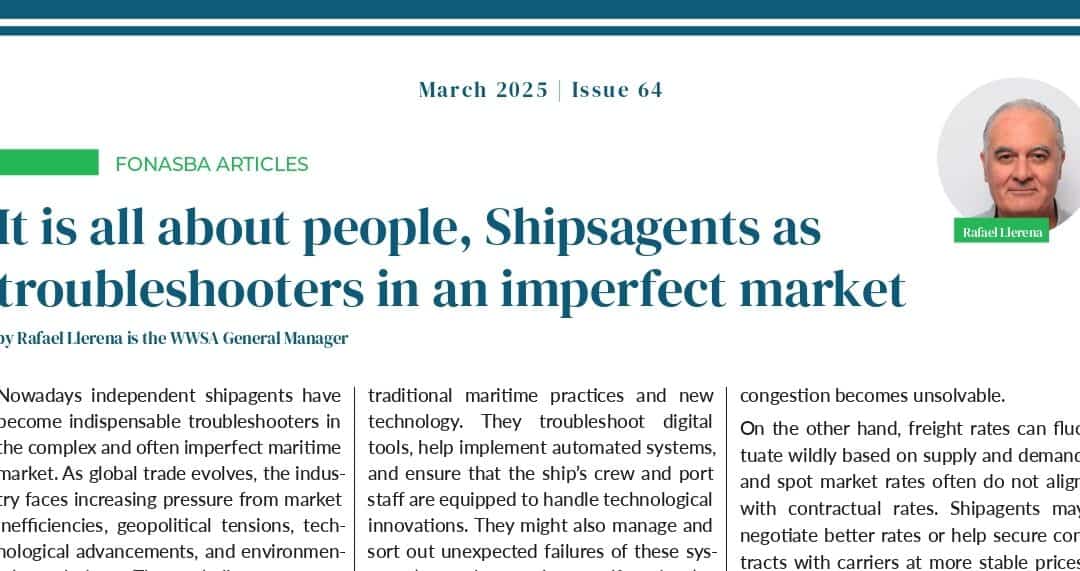WWSA shared its views in the latest FONASBA Newsletter N.64, discussing the role of the shipagents, who have become indispensable troubleshooters in the complex and often imperfect maritime market.
Nowadays independent shipagents have become indispensable troubleshooters in the complex and often imperfect maritime market. As global trade evolves, the industry faces increasing pressure from market inefficiencies, geopolitical tensions, technological advancements, and environmental regulations. These challenges create a number of problems that require agile, adaptive solutions, and ship agents are at the forefront of resolving them. In other words, their role as troubleshooters has grown as a response to the imperfections of the market and the global supply chain.
Shipagents act as mediators and negotiators, working with several parties to optimize routes, manage the timing of port arrivals, and keep costs in check. They may negotiate with carriers, ports, and service providers to ensure that vessels can dock and unload as efficiently as possible, mitigating the effects of any delays caused by
cited market’s imperfections.
The maritime industry is transitioning toward automation, digitalization, and smart shipping: Tha’s fine! Shipagents are responsible for bridging the gap between traditional maritime practices and new technology. They troubleshoot digital tools, help implement automated systems, and ensure that the ship’s crew and port staff are equipped to handle technological innovations. They might also manage and sort out unexpected failures of these systems (e.g., cyberattacks or malfunctions).
As environmental compliance becomes in creasingly complex, shipagents help their clients comply with emissions standards, arrange for fuel alternatives (e.g.,biofuels), and ensure that environmental guidelines are followed during port calls. Additionally, agents assist with obtaining necessary certifications and help shipowners and operators to avoid penalties by staying ahead of those regulatory requirements.
Moreover, the growth of global trade and a lack of adequate investment in port in frastructure has led to widespread port congestion, slow processing times, and delays in loading and unloading. Professional shipagents help optimize port call schedules to minimize waiting times, negotiate with port authorities to get priority, and even recommend alternative ports if congestion becomes unsolvable.
On the other hand, freight rates can fluctuate wildly based on supply and demand, and spot market rates often do not align with contractual rates. Shipagents may negotiate better rates or help secure contracts with carriers at more stable prices. They also have local market knowledge on local market trends, enabling both, owners and cargo interests, to make more in formed decisions on transport options.
In today’s interconnected world, shipagents have become the essential troubleshooters that bridge the gaps caused by market imperfections and uncertainties. Their expertise and ability to adapt and negotiate makes them key players in ensuring the smooth operation of global trade.
In essence, independent shipagents are reactive and proactive facilitators, helping to navigate the stormy seas of market volatility, geopolitical risks, technological shifts, and environmental demands, safeguarding not only the ship and its crew but also the integrity of the entire supply chain. So, as said : “It’s all about (skilled…) people !”

